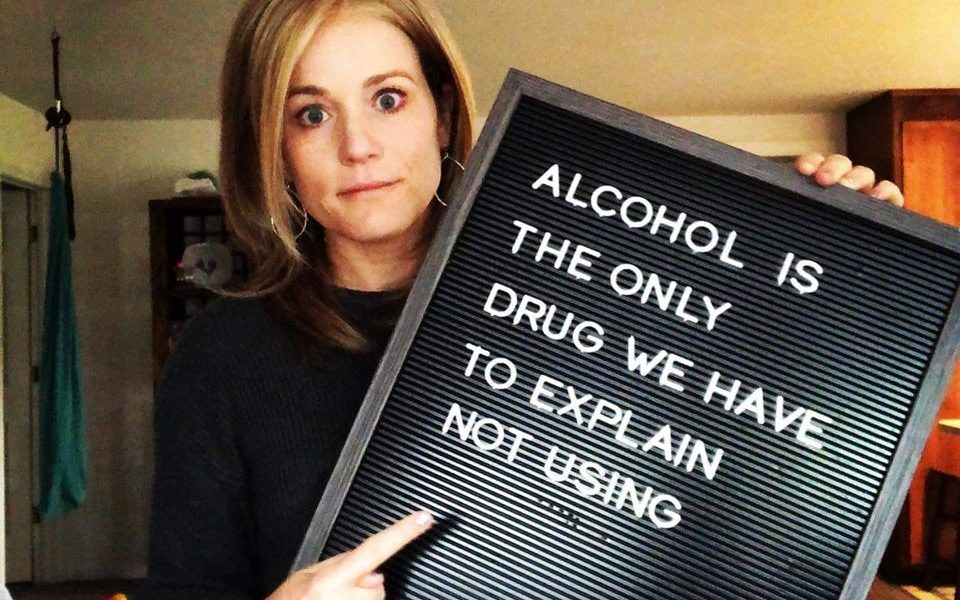Alcohol is the only drug we should never have to explain not using. It’s also a choice of beverage worth examining why we are drinking it if and when we choose to personally partake.
Alcoholics encourage other people to drink; refuse to be impressed or complicit. Alcoholics also tend to get very unnerved or upset (or they pretend to be offended) if they ask you to drink with them and you refuse their offer to entertain their dysfunction.
Oddly enough, liquor is the only drug peers commonly publicly and privately pressure their friends and family into using with them. People with addiction-prone personality types tend to love it while those who are health and lifestyle conscious tend to be wary of including the regular use of it in a diet.
Non-drinkers oftentimes have to explain why they (we) are not interested in using. The demand for people to partake in the ritual of drinking or to have to publicly reveal personal or medical issues related to alcoholism is bizarre, for sure.
Understanding why the use of alcohol was made commonplace medically and socially is the key to leaving the habit of toxic thinking behind. Misery loves company is a lesson to heed from the bar.
Alcohol is the only drug that everyone was told growing up during the second half of the 20th century was safe to use socially because it was legal. Many adult children of toxic parents were magical thinking convinced that if someone had a drink it made their problems ease or abate.
As such, many people from the Baby Boomer era and Gen X emotionally and socially felt or feel safe drinking liquor in private or in public. The idea is that it’s a lawful (arguably medically approved or recommended) coping mechanism individuals can choose to use any time of the day in order to alleviate social anxiety.
Bloody Marys or Mimosas for Brunch anybody? Common Country Club banter.
It’s the 21st century and drinking to solve personal problems or to self medicate for pain no longer makes sense. Outer Space Travel, for instance, is likely to require humans seek to strengthen DNA rather than to weaken strands.
Alcohol is a genetic solvent. It causes Object Permanence Syndrome delusion and decays human’s ability to reason morally, ethically, or in any way situationally.
Between old Slaver Families buying up Liquor Stock and manipulating things like Liquor Licenses for bars and restaurants as well as political monkeying with things like dry counties and Alcohol Taxation and the rise of Marketing Monopolies, folks (especially those in North America) have had literally no choice to avoid people who enthusiastically use the utterly medically caustic and social stability compromising products.
People sure they were going to die in a war or by Nuclear Holocaust in the 20th century had no real psychiatric or emotional support network. Many turned to the bar and Alcoholic friends there for comfort post Prohibition out of desperation.
Many of these same individuals should never have been lauded as the Greatest Generation’s or any of the Baby Boomer’s social role models. They also should not have been granted access to social power or control over things like military, intelligence branches of government, and or weapons.
The aforementioned cultural reality is what it is as well as what it was… a medical reaction to war, poverty, and terror to look for a drug or coping mechanism to assist people who were terrified and traumatized with self-medicating for issues related to things like PTSD, C-PTSD, and their own FAS and issues caused by non-diagnosed Tylenol Poisoning.
Take charge of your social and emotional life related to alcohol. Realizing it’s a danger is a huge step in emotionally overcoming social programming that lends itself to consumption-based thinking.
It’s not like using recreational weed or medical marijuana when a person chooses to down a few drinks; drinking alcohol does harm to the body while lowering reasoning ability and compromising Emotional Intelligence (EQ) completely.
Don’t be afraid to let people know that you are happier without rather than with alcohol around if that is your natural state of social comfort around others… especially if you were or are always the sober one who has spent your life micromanaging trauma caused by drinkers.
Assume control of your personal anxiety management.
If you have a choice to self-medicate during a period of stress, starting with meditation and self-reflection to get ahold of the physical and emotional reins of the mind and spirit tends to work best.
If you are in a state where there is a healthier option for self-medication, seeking out a local dispensary and chatting with professional growers about types of herbal options available to ease issues with things like pain or anxiety is always an educational experience and sound medical idea.
Learn your limits and know how to avoid breaching them socially or emotionally related to exposure to Barfly, Booze Hound, Party Party, and or Club Culture.
Be realistic. If you know you or a mate or a friend behaves poorly or ends up in emotional duress every time you or they start drinking, understand stop means the utter absence of go (to begin with).
Set healthy boundaries with friends and family related to alcohol exposure. If you don’t want to be around it, avoid going places with people who drink or where any liquor products are served or are the main focus of the gathering or event.
If drunk people or people drinking booze stresses you out, avoid social engagements with any of it; instead, choose to focus on prioritizing your inner peace.
Learning to decline social invitations (or choosing to spend limited amounts of time with daily drinkers during hours they are not likely to be drinking) can allow any person striving to avoid enabling Alcoholics or toxic behavior to escape being trapped in a socially awkward and or a traumatizing social situation.
After all, there’s nothing much worse socially than being left at the mercy of a drunk or in the company of mobbing inebriated, hooting and hollering, quick to irrationally anger-prone folks.
Dare to care about who you do or do not choose to spend time with socially — putting active Drinkers and Dry Drunks on the Low Contact to No Contact list for things like family dinners, holidays, and or special memorial events.
Those you know who do still drink, pay careful attention to how much and in what context; if someone has a beer once in a while after mowing a lawn it’s not going to create the same medical effect on a personality as having alcohol, for instance, added to someone’s daily diet as a beverage option.
Be mindful that people who get old and have to cut back on their drinking and folks forced to stop drinking for legal reasons and or for medical necessity are likely to exhibit Dry Drunk behaviors.
Listen to how they talk about drinking alcohol; if someone still glorifies being lit and discusses how much they miss it, realize they are simply an Alcoholic without reasonable physical access to it.
Stop listening to #DryDrunks and Alcoholics who shame people who refuse to drink genetic solvent willingly or “for fun”. Their behavior is foolish and makes them sound morally insane as well as medically ridiculous — non-drinkers choice to protect their physical and social well being are smart.
Refuse to be socially impressed by those who drink like it’s a thing or a sport. Make better health and social role modeling decisions about what is fun.
If you come from a toxic family, chances are one or more people in your family unit are profoundly impacted by issues related to FAS. FAS is Fetal Alcohol Syndrome and the damage it causes is profound across generations.
Individuals with FAS are the most likely genetic type to develop lifelong personality dysfunction. Expect issues related to high-risk behavior and impulse disorders to consistently plague them.
In addition, it’s crucial for all humans to understand that FAS causes and has caused rampant Object Permanence Syndrome issues. OPS is the adult version of thinking if one cannot see something physically or personally that it does not exist.
If you ever played Peek-A-Boo with a child who understood you are still there when they cannot see your face or your body (depending on how you are hiding), then you did a good thing — teaching them the neurological pathways and skill sets to help them grasp the concept that even if you cannot see something like a higher power that it does not mean someone like a God is not watching.
Kids with FAS never seem to understand that if mother is in the other room and cannot see what they are doing that the child’s behavior out of eyesight line does not matter. They also fail to realize mother has ears and can more than likely hear whatever they are doing if and when their IQ due to missing EQ is physically compromised.
Know the mindset of people with addictions issues. Most think if they sneak a drink, a drug, an affair, or if they harm a victim and then are successful conning or bullying them into keeping abuse or neglect a secret that they are somehow a social victor who “got away with it”.
They medically, spiritually, and genetically didn’t, they don’t ever, and they never physically will be able to avoid being the cause of consequences for their socially ill-advised free will choice ethical (arguably deplorable) alcohol-related decisions. It’s a problem — a true DRINKING PROBLEM.
A person with FAS related Object Permanence Syndrome issues is likely to become a Pathological Liar and Pervasive Gaslighter. The phrase “They Lie like a RUG!” comes to mind as a common descriptor for the ethically and neurologically compromised alcohol exposure addled person’s behavior.
Moral minded individuals tend to take Pascal’s Wager. People with healthy EQ and IQ know on a psychobiological level that lying is fundamentally wrong whether a person who lies gets caught lying or not.
But…
A person with OPS issues will tend to self promote without regard to morality or any concept of spiritual supervision and or consequences. They stick psychologically and emotionally somewhere between 18 months old and the “Me Me Me Mine Mine Mine” era or early childhood development and never neurologically or biochemically (emotionally) further mature.
Those same people tend to have addictions issues throughout life — not simply related to alcohol. Whatever they think will make them cutting or edgy — or net gain them the most social attention (for positive or negative) is what the person whose life has been shaped by early childhood caretakers drinking and NLP programming of social norm to pursue is what the toxic individual is likely to do.
The impulse issues FAS causes, especially if a person’s mother drank alcohol and used any Tylenol products when they were pregnant, tend to leave the impacted child born feeling a lack of empathy or interest in managing or caring for anyone else’s social-related emotions.
By refusing to strive to limit social “cool” factor in the United States, WWII Generation parents — already themselves tragically impacted by exposure to alcohol and bootleg liquor made in unsafe brewing conditions from the time of arrival (that led to things like heavy metal poisoning of drinkers and brewers taste test sipping as well) — set the profoundly passive suicidal habit to do things like drink to fit in in place in their eras that has led to the profound medical compromise of American society today.
Placing individuals who drink alcohol in key positions in politics and the government — including judges and lawmakers and enforcement officers — has left the nation weak and collectively, psychologically, and metaphorically addled.
Having people who think if they lie and don’t get caught or if they do get caught that as long as they are more socially or physically violent than any witness or accuser that it means might makes moral right.
This pathology typifies the Alcoholic Family Unit and nurtured Dry Drunk profoundly socially and emotionally retarded (meaning low functioning and dysfunctional, regressed) mentality.
Alcohol is the only drug no one has to explain using because our toxic parents and toxic grandparents we personally watched as young children turn to liquor to solve social anxiety and emotional trauma-related problems.
What most of us fail to factor in who fall for the lackadaisical con of “oh just have a drink and forget your problems” is how tragically unsuccessful managing their psychological health and overall emotional bodies that our elders and the “party till dawn” generations among the world’s population have been.
People who justify self-abuse and the social neglect or mistreatment of others while they self-indulge in emotionally hedonistic behavior are the group of toxic peers who are the problematic and likely Cluster B and or impulse-driven FAS impacted Adult Children of Toxic Parents who this article focuses on for discussion.
Having a glass of wine with a meal, a glass of champagne to celebrate a special event, or a specialty cocktail once in a while for the flavor is not the same personality profile as, say, for instance, a person who has one drink… then two… then three days later they are 35 drinks in and screaming in front of a child or battering a spouse.
Those same people who enjoy sipping a hot coffee with a shot of liquor after dinner during a chilly winter are not likely to blame a shot of Amaretto in Decaf for doing something like having a torrid love affair with some stranger they met at a bar.
They are also not likely to enjoy a shot of Grand Marnier in Dark Chocolate Fondue and use it as an excuse for abandoning the family and pulling a disappearing act for days or weeks or months while they indulge themselves in a bender (minus any humorous reference to Futurama).
So…
If you are a person who does not like to drink, celebrate.
If you are a person smart enough to avoid drinking to alleviate social anxiety or emotional problems, be thankful.
But if you are a person who finds the argument “Alcohol is legal” as an excuse to self-harm while committing passive suicide and neglecting as well as abusing other people’s hospitality…
Or a person who thinks it’s okay to do things like have a cocktail and to get behind a wheel…
Get your DNA test done someplace like ancestrydna.com or 23andme.com and send the Raw Data results to promethease.com — a medical results website that looks at DNA markers for issues related to FAS, addictions proclivities, genetic damage, hereditary illnesses, and everything else under the sun.
You can check to see if you have direct FAS from your mother.
[Sorry to any good mom who simply made a mistake or did not know any better instinctively than to do something as foolish as to have unprotected sex after they had been drinking.]
You can also see if you are likely to feel drawn to using things like drugs or alcohol due to a genetic proclivity.
And if you know all of these insights already and choose to drink on a regular basis or to functionally enable and to socially esteem alcoholics already… it’s well past time to self reflect and to ask yourself what you were shown growing up or taught about self-medicating with alcohol by or before you were four years old by your earliest childhood companions and caregivers.
Why?
Because an unexamined life is not worth living? No.
Because your life and your health and your relationship to a need to self-medicate matters most.
Be brave and consider being nicknamed a TEA TOTALER.





